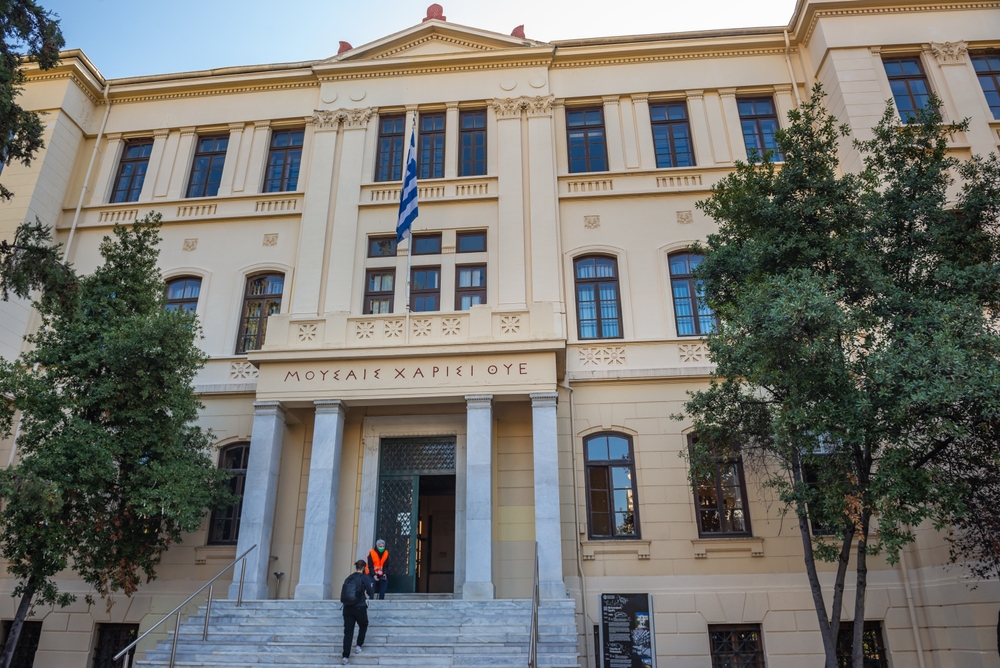UNIVERSITIES
Studying MBBS in Greece

Are you dreaming of studying MBBS abroad? Why not consider Greece? It is known as the birthplace of Hippocrates—the father of modern medicine and could be your ideal destination. While often overlooked by other popular countries like Germany or the UK, Greece is considered a hidden gem for aspiring medical practitioners. With a rich history in medical knowledge, Greece offers high-quality education, affordable living, and an opportunity to experience its rich culture.
It offers some of the most accessible and reasonable MBBS programs (Bachelor of Medicine, Bachelor of Surgery) in Europe. These programs are recognized all across the globe, with degrees that are valid across the European Union (EU) and in other countries, allowing you to practice medicine in different parts of the world.
The universities of Greece are well known for their academic excellence, with medical faculties that involve renowned professors and researchers. These universities provide top-notch medical facilities and offer diverse learning experiences, combining theoretical knowledge with hands-on clinical training in various healthcare settings.
Graduating from a Greek medical university provides you a competitive advantage in the global healthcare industry. Greek medical degrees are recognized by the World Health Organization (WHO), which allows you to pursue further studies, specializations, or even a career in different countries across the globe.
In this comprehensive guide, we will discuss everything you need to know about studying MBBS in Greece, from the application process and entry requirements to tuition fees, and the top medical universities in the country. Additionally, we’ll explore career prospects after graduation, licensing requirements, and what it’s like to live and study MBBS in Greece as an international student.
Are you interested in studying medicine in Greece?
We would be happy to advise you free of charge about your options for studying medicine in Greece.
The advantages of studying MBBS in Greece
Studying medicine is a demanding and long educational path. It is, therefore, important to be particularly careful when choosing the place where you start this career. Studying medicine in Greece has the following advantages:
1. Top-notch medical education: Greek medical universities are well-known for their high-quality education and a strong focus on theoretical and clinical training. Moreover, Greece has a rich medical tradition, and its medical universities are renowned for creating skilled medical professionals.
2. Medical history significance: The country has a rich medical history, with the ancient Greeks making significant contributions to the field. Studying MBBS in Greece offers a great experience to students in a country with a long history of medical practice.
3. English-taught programs: Many medical universities in Greece offer MBBS programs taught in English, making it accessible to Indian & other international students. This removes all sorts of language barriers for international students.
4. Cost-effectiveness: Tuition fees for MBBS in Greece can be lower than in other European countries or North America. This can make studying MBBS in Greece a more affordable option for many students.
5. EU recognition: Greece is a member of the European Union (EU), and its medical degrees are well-recognized throughout the European Union. This recognition can ease further medical training or practice in other European countries.
6. Clinical exposure: Greek medical programs basically offer extensive clinical exposure and hands-on experience through partnerships with local hospitals and healthcare facilities. This practical training is important for medical students.
7. Research opportunities: Research opportunities in various medical fields are available, and universities encourage students to participate in research projects, which can enhance their academic and professional profiles.
8. Cultural experience: Studying MBBS in Greece allows students to experience its rich culture, history, and beautiful landscapes. Greece's Mediterranean climate and varied landscapes provide a unique living experience.
9. Safety and quality of life: The country is well-known for its safety, healthcare system, and overall quality of life. Students can benefit from a comfortable and secure living environment while pursuing their medical education.
10. Gateway to Europe: Greece's location in southeastern Europe makes it a gateway to explore other European countries, improving travel and cultural experiences during breaks or holidays.

Together for success - futureMBBS and studying medicine abroad
Do you want to study medicine abroad and are looking for the most suitable university for you and don't really know where to start looking for the right country and a good university? futuredoctor is happy to support you!
Besides the Student advisory service In addition to selecting the university and accompanying you to the desired on-site appointments, futureMBBS also offers support during the application process and preparation for possible aptitude tests, as well as orientation at the place of study - including the search for accommodation! Get your application quickly and easily free info pack!
At which universities is it possible to study MBBS in Greece?
Medical studies in Greece are offered at seven universities, and some of them also offer an English-language degree program in human medicine.
Aristotle University of Thessaloniki Medical School

The Aristotle University of Thessaloniki is one of the most renowned universities in Greece and enjoys an excellent reputation. It was founded in 1925 and is one of the largest educational institutions in Europe with over 88,000 students. The Faculty of Medicine offers medical studies in English for 60 foreign students. There are numerous student councils and associations on the international campus. This offers you an excellent opportunity to quickly make connections and exchange ideas with your fellow students.
University of Athens School of Health

The University of Athens offers a medical degree programme in English in addition to the Greek medical degree programme. This is aimed exclusively at international students. In addition to the medical lectures, you also have the opportunity to take a Greek language course.
University of Crete Faculty of Medicine
The Faculty of Medicine at the University of Crete was founded in 1983 and is one of the largest in Greece. International students can study medicine in English. In the form of lectures, seminars and clinical traineeships, you will be taught everything you need for your future medical career, both theoretically and practically.
The Faculty of Medicine at the Democritus University of Thrace was founded in 1997 and offers medical studies in Greek. It is internationally recognised for its medical research and high quality education.
Top 10 universities in Greece for MBBS (Bachelor of Medicine and Bachelor of Surgery)
1. National and Kapodistrian University of Athens
2. Aristotle University of Thessaloniki
3. University of Patras
4. University of Crete
5. University of Thessaly
6. University of Ioannina
7. University of Macedonia
8. University of Peloponnese
9. University of Cyprus (Nicosia, Cyprus)
10. University of Nicosia Medical School (Nicosia, Cyprus)
MBBS (Bachelor of Medicine and Bachelor of Surgery) Specializations in Greece
University | Location | Course Duration | Specializations (covered within the MD program) |
National and Kapodistrian University of Athens | Athens | Typically, 6 years | Internal Medicine, Surgery, Paediatrics, Obstetrics and Gynaecology, Neurology, Cardiology, and many others are covered during the program. |
Aristotle University of Thessaloniki | Thessaloniki | Typically, 6 years | Similar to the University of Athens, various medical specializations are covered as part of the MD program. |
What are the requirements for studying MBBS in Greece?
For the English-language medical degree programs, you will need your high-school certificate. A good final grade and good performance in the natural sciences are an advantage, but not decisive for the application. Alternatively, you have the option of taking a university-specific selection test or the Biomedical Admissions Test (BMAT) or the Medical College Admissions Test (MCAT).
You should be able to present an IELTS or TOEFL language certificate as proof of your language skills. You should note the minimum score requirements of the respective university.
What exactly do you need, and where? We'll help you get an overview. Other requirements include the following:
1. Academic qualifications: The students should have completed their secondary education or equivalent qualifications. They will need to provide transcripts and certificates as proof of their academic qualifications.
2. Language proficiency: Since many MBBS courses in Greece are taught in English or Greek, depending on the university, you may need to showcase proficiency in the language of instruction. If you decide to study in English, you may need to provide proof of English language proficiency through exams like IELTS or TOEFL.
3. Entrance exams: Some medical universities in Greece require applicants to take entrance exams, such as the Biology and Chemistry Olympiad exams to assess their knowledge in relevant subjects. It’s important to check whether the course you are interested in has entrance exam requirements.
4. Passport and visa: International students are required to have a valid passport. Moreover, you will need to attain a student visa to study in Greece. Visa requirements may include proof of acceptance into a Greek university, financial documents, etc.
5. Health and vaccinations: Some universities may ask applicants to provide proof of certain vaccinations or health examinations. It’s important to check with the university for specific health-related requirements.
6. Letter of intent or personal statement: Universities often request a letter of intent or personal statement as part of the application process. This statement should outline your motivation for studying medicine and your qualifications.
7. Letters of recommendation: Universities also require letters of recommendation from teachers, professors, or professionals who can attest to your academic abilities and character.
8. Interview: In some cases, universities can conduct interviews as part of the admission process. This interview will assess your motivation for pursuing MBBS and your suitability for the program.
9. Age limit: There is no strict age limit for undergraduate programs like MBBS, but it's still important to check with the preferred university regarding any age-related requirements.
10. Additional requirements: Every university has its requirements, so it's essential to go through the admission criteria for the course you wish to apply to and check the university's official website for the most up-to-date information.
The application process for MBBS in Greece
The application process & entry requirements for MBBS in Greece differ depending on the university and the student’s nationality. However, some basic requirements apply to all international applicants. Below we’ve mentioned some of the major entry requirements for MBBS in Greece:
Entry requirements
The student must have completed their secondary education and secured a high school diploma or equivalent qualification. According to the Greek grading system, the minimum grade required for admission is 10 out of 20.
MBBS courses often require you to have taken subjects such as biology, chemistry, physics, and mathematics in your high school curriculum.
Some universities may require you to take the Test for Medical Studies (TMS), which is a standardized test that evaluates your aptitude and skills for medical studies.
Language proficiency tests
To pursue an MBBS course in Greece, the student should have a good command over Greek language, as the primary language of instruction is Greek (except for the English-taught programs mentioned above). Some universities offer Greek language courses to help.
You may need to submit a certificate of Greek language proficiency, such as the Certificate of Attainment in Greek issued by the Centre for the Greek Language, or the Certificate of Greek Language Proficiency issued by the Hellenic American Union.
Some universities may also accept alternative certificates or exams, such as TOEFL, IELTS, or Cambridge English tests, as proof of English language proficiency, since some universities offer English taught programs.
Documents required for MBBS (Bachelor of Medicine and Bachelor of Surgery) in Greece
1. Application form: Universities in Greece mostly have an online application system where the student has to fill out an application form by following the instructions provided by the university for the application process.
2. Academic transcripts: Official transcripts of your secondary school or higher secondary education, including grades and courses completed must be provided. Transcripts should be in the original language and, if not in Greek or English, accompanied by an official translation.
3. High school certificates: Submit a copy of your high school diploma or certificate as proof of completing your secondary education. If the document is not in Greek or English, you will need to provide a certified translation along with the original document.
4. Language proficiency proof: If you’ve opted for an English-taught program and you are a non-native English speaker, you may need to provide proof of English proficiency through exams like IELTS or TOEFL. It’s important to check the specific language requirements of the preferred university.
5. Passport copy: You will need to provide a copy of your valid passport. Make sure that your passport is valid for the entire duration of your stay in Greece.
6. Letter of intent or personal statement: The applicant will have to write a letter of intent or personal statement explaining their motivation for studying medicine, their academic and career goals, and why they wish to study in Greece.
7. Letters of recommendation: Universities also ask for letters of recommendation from teachers, professors, or professionals who can attest to your academic abilities and character.
8. Entrance exam results: In case the university conducts entrance exams, you will have to provide the results of these exams. This may include the Biology and Chemistry exams.
9. Health and vaccination records: In some cases, the universities may require proof of specific vaccinations or health examinations. It’s important to check with the university for any health-related requirements.
10. Financial documentation: Applicants will need to provide proof of their financial capacity to cover tuition fees and living expenses in Greece, such as bank statements, sponsorship letters, or scholarship award letters.
11. Student visa: After receiving an acceptance letter from the university, the applicant will need to apply for a student visa. They will have to check with the Greek embassy or consult their home country for visa requirements and documentation.
12. Passport-sized photos: Passport-sized photos are required as part of your application.
13. Other requirements: Some universities may have other requirements or specific forms that you need to fill out. You may check the university's official website and contact their admissions office for guidance.
How is the medical degree program in Greece structured?
The structure of the medical degree program in Greek or English is similar to many other European countries. It has a Total duration of study of six years.
In the first two years, the basic subjects of biology, chemistry, physics, anatomy and physiology are covered. This period is comparable to the pre-clinical phase in Germany. This is followed by the clinical study phase. Building on the knowledge gained in the first semesters, you will now learn about the diagnosis and treatment of various diseases in different medical specialities. At the same time, you will have numerous internships on various hospital wards, such as in internal medicine, surgery or paediatrics, to gain practical skills and experience. The final year, or at some universities the last three semesters, serve to deepen your practical skills and ends with a state final examination.
How much does it cost to study MBBS in Greece?
The cost of studying medicine in Greece vary from university to university.
Education is basically free of charge for Greek residents. Students from abroad have to pay tuition fees of around 10,89,831 INR - 11,80,699 INR (12,000 - 13,000 euros) per year for the English-language medical degree programmes. For this you should apply for support by means of a Scholarship for studying medicine abroad into consideration.
The cost of living is made up of rent, food, toiletries, transport, study materials and other leisure expenses. These are somewhat cheaper in Greece than in Germany and range from around 54,493 INR to 90,823 INR (600 euros to 1,000 euros), depending on where you live and your lifestyle.
Country and people: Interesting facts about Greece
With around 250 days of sunshine and an average of 3,000 hours of sunshine, Greece is considered one of the most sunniest countries in Europe.
Mount Olympus is the highest mountain range in Greece and consists almost entirely of Mesozoic limestone. According to Greek mythology, this is where the Seat of the gods.
Athens is the capital of Greece and is considered the cultural centre of the country. In the city you will find many cultural and historically significant legacies of ancient Greece. As the city has been inhabited for over 7,000 years, it is regarded as a Europe's oldest still inhabited city.
Life in Greece
Living in Greece can be a fulfilling and cost-effective experience for international students interested in pursuing a career in medicine and healthcare. Here are some important aspects of life in Greece that you should be aware of.
Greek culture
Greece has a rich and influential tradition of medicine that dates back to ancient times. It is famous as the birthplace of Western civilization, democracy, philosophy, literature, and much more. Greek culture is a blend of Eastern and Western influences, shaped by various historical events and influences. Greeks take great pride in their culture and heritage, expressing it through art, music, literature, cuisine, festivals, and religion. They are known for their warm hospitality, friendliness, and strong emphasis on family, friendship, and joy.
Environment
Greece is a country with a stunning and diverse natural environment, featuring numerous islands, beaches, mountains, and forests to discover. Studying here can be an amazing experience for those who love nature and outdoor activities. The country enjoys a mild and sunny climate with four distinct seasons.
Language
The official language of Greece is Greek, which is a descendant of the ancient Greek language. Almost all the population speaks Greek, and it is the primary language of instruction in most universities. However, some courses or electives may be taught in English. Additionally, many Greeks also speak English as a second language.
Transportation
Greece has an advanced and cutting-edge transportation network that includes metro, buses, trains, trams, taxis, and ferries. Greece has reasonably priced, frequent, and dependable transportation system that travels to most areas of the country. Taxis are affordable and feasible, especially if you share them with other people. The greatest way to go between the islands is via ferry, which also offers nice amenities and beautiful scenery.
Healthcare
Greece has a universal healthcare system that offers free or reduced-cost healthcare services to all citizens and residents. The overall quality of healthcare in Greece is usually excellent, with well-trained and experienced medical staff. However, public hospitals in rural areas may not always provide the same level of care as private hospitals. Therefore, it is advisable to have valid health insurance, either from your home country or from a private provider in Greece.
Food & cuisine
Greece's food is inspired by a variety of Middle Eastern cuisines and is classified as Mediterranean food. Greek cooking contains a lot of olive oil, fish, meat, dairy, herbs, and vegetables. Oregano, garlic, and lemon are frequently used as seasonings. Moussaka, souvlaki, gyro, spanakopita, and feta cheese are among the foods that are very popular in Greece.
Life as a medical student in Greece
Studying MBBS in Greece has its own pros and cons. Here's what you can expect during your time as a medical student in Greece:
Intense study schedule
Medical programs in Greece are indeed demanding, requiring students to attend lectures, participate in lab work, and complete clinical rotations. To succeed, it's important to stay organized and manage your time effectively in order to balance academic responsibilities with personal interests and social life.
Language barrier
While many Greeks are fluent in English, most medical courses are conducted in Greek. This presents a challenge for international students, so dedicating time to learn the language is essential to excel academically and integrate with the local community.
Cultural adaptation
Adapting to a new country and culture can be both rewarding and challenging. Students get to embrace the opportunity to explore Greek customs, attend local events and festivities, and enjoy the delicious local cuisine.
Travel opportunities
Greece's location in Europe makes it an ideal starting point for exploring the continent. Use your free time to plan trips to neighbouring countries like Italy, Turkey, or Cyprus.
Networking and professional development
Studying MBBS in Greece allows you to connect with other students, professors, and professionals in the medical field. These connections can prove invaluable and can be a great help for your future career, enhancing your learning experience.
Career prospects for an MBBS from Greece
Greece has a variety of career prospects for MBBS graduates, both in Greece and abroad. Below we’ve mentioned some of the major career options for MBBS graduates in Greece:
1. Practice medicine in Greece
As an MBBS graduate in Greece, one is qualified and licensed to practice medicine in the country. They can either work as a general practitioner or specialist in public or private hospitals and clinics. The average salary of a doctor in Greece is €36,000 per annum.
2. Practice medicine in the EU or other countries
Medical graduates with an MBBS degree from Greece can pursue a medical career in the EU or other countries, as their qualification is recognized and accredited throughout the EU and beyond. The average annual salary for a doctor in the EU is €60,000, while the average salary for a doctor in other countries varies according to the location and specialization.
3. Continue a career in research or academia
Based on your extensive scientific research background and clinical experience, you could pursue a career as a researcher or professor at a university, or within the pharmaceutical or biotechnology industry. The average annual salary for a researcher or professor in Greece is €25,000.
4. Continue further education
Consider specializing in your career by pursuing additional education and training in your field of interest, such as a master’s or doctoral degree, or participating in a residency or fellowship program. You have the option to do this in Greece, elsewhere in Europe, or in any other country around the world.
What should I bear in mind when applying to study MBBS in Greece?
Applications to study medicine in Greece are usually made online via the application portal of the respective university. There you must apply within the Application deadlines upload various documents, such as a certified and translated copy of your school-leaving certificate, the results of the selection test and a letter of motivation.
Are you ready to realise your dream of studying medicine in Greece? Contact us today and start your journey with futureMBBS. We look forward to accompanying you on your journey and working with you to realise your dream of a career in medicine.
STARTING SHOT
What are you waiting for? 🎉
Order your information package now, find out about studying medicine abroad and get started as a medical student!
FAQs about studying medicine in Greece
What are the advantages of studying medicine in Greece?
Greece offers some medical degree programmes in English, and study in a holiday destination with a rich history, nature and hospitality.
Which universities in Greece offer a medical degree programme?
Greek universities that offer medical studies include the Aristotle University of Thessaloniki, the University of Athens School of Health and the University of Crete Faculty of Medicine.
What are the requirements for studying medicine in Greece?
For English-language medical degree programmes, you need a high school diploma, good grades in natural sciences and participation in a selection test or the Biomedical Admissions Test (BMAT) or Medical College Admissions Test (MCAT).
How is the medical degree programme in Greece structured?
The degree programme lasts six years and includes basic subjects and clinical studies with internships in various medical specialties.
How much does it cost to study medicine in Greece?
Tuition fees for English-language medical degree programmes are around 10,89,831 INR - 11,80,699 INR (12,000 to 13,000 euros) per year. The cost of living is around 54,493 INR to 90,823 INR (600 to 1,000 euros) per month.
What are some interesting facts about Greece?
Greece is one of the sunniest countries in Europe, home to Mount Olympus and Athens is considered the cultural centre of the country and the oldest inhabited city in Europe.
What should I bear in mind when applying to study medicine in Greece?
To apply, a school-leaving certificate, the results of the selection test and a letter of motivation must be submitted online via the application portal of the respective university.
Are the degree programmes in Greece in English or Greek?
The majority of degree programmes are offered in Greek, but there are also some universities that offer medical studies in English.
Can I work in Germany after my studies in Greece?
The medical degree in Greece is recognised in the EU, which enables graduates to work in various European countries, including Germany.
29 countries for your medical studies
Netherlands
Groningen, Maastricht, Amsterdam, Leiden, Utrecht, Rotterdam
Switzerland
Basel, Fribourg, Bern, Geneva, Zurich, Neuchâtel, Lausanne




























